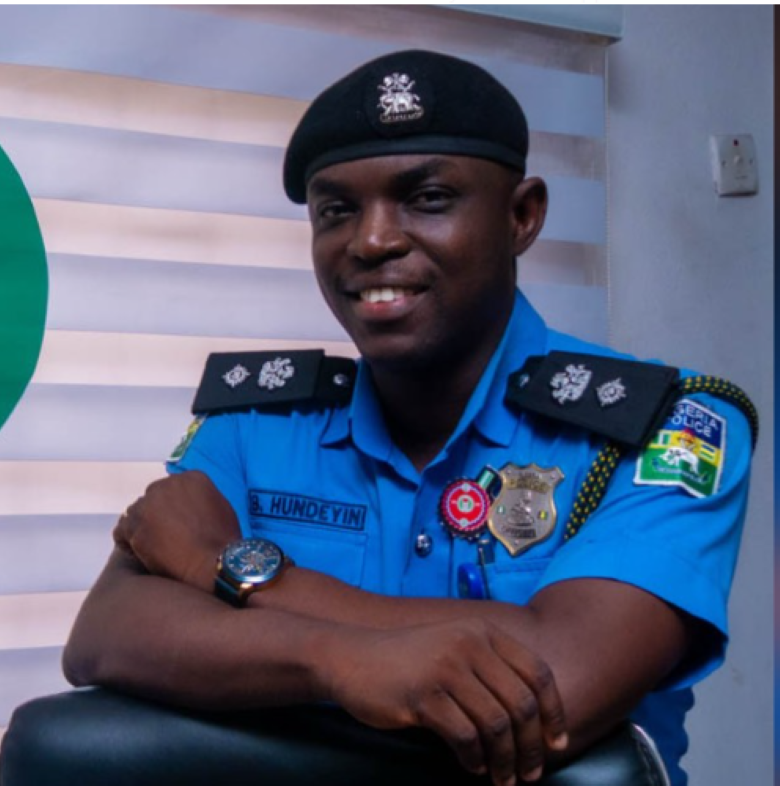By Benjamin Hundeyin
A TIME FOR REFLECTION AND CELEBRATION
(1) As Nigeria clocks 65 years of independence, we are reminded that sovereignty is sustained not only by democracy but by security—the confidence of a people to live free from fear. In this journey of nationhood, the Nigeria Police Force (NPF) has stood as the foremost guarantor of internal order, the institution whose resilience sustains both statehood and stability. Today, under the leadership of the 22nd Indigenous Inspector-General of Police, IGP Kayode Adeolu Egbetokun, PhD, NPM, the Force has become a renewed symbol of courage, reform, and innovation. It has matched the President’s Renewed Hope Agenda with results that impact every community in Nigeria and resonate internationally. This anniversary is not just a celebration of history, but a testimony that Nigeria’s security architecture, anchored by the NPF, is ready for the future.
A PARADIGM SHIFT IN POLICING
(2) Nigeria is witnessing a radical transformation in the philosophy and practice of policing. The NPF has shifted from a reactive model—responding after crime occurs—to a forward-looking system built on anticipation, prevention, and people-centred service. This paradigm shift has been most visible in communities across all 36 states and the FCT, where improved patrol presence, community dialogue, and quick response mechanisms have restored confidence in the police. International observers, too, now point to Nigeria as an example of how large police institutions in developing democracies can reinvent themselves through strategic vision and leadership. Nigeria is no longer policing yesterday’s problems; it is anticipating tomorrow’s threats and meeting them with vision.
TAMING THE CRIME TIDE: OPERATIONAL TRIUMPHS
(3) The Nigeria Police under IGP Egbetokun has demonstrated a heightened operational tempo and doggedness, resulting in significant successes against criminal elements. In just two months, 4,383 suspects were arrested nationwide—ranging from armed robbery (481), kidnapping (260), homicide (371), and rape (322) to cultism (375) and unlawful possession of firearms (161). Beyond these arrests, 1,138 kidnapped victims were rescued and reunited with their families, while the seizure of 716 firearms, over 21,000 rounds of ammunition, and 212 stolen vehicles disrupted criminal logistics chains across multiple states.
(4) These celebrated stories echo in Zamfara, Katsina, and Niger, where victims rescued from the clutches of kidnappers became living testimonies of renewed policing efficiency. In Lagos and Rivers, decisive crackdowns on cult gangs restored normalcy to once-troubled communities. In the North East, police tactical units worked hand-in-hand with the military to degrade terror networks, while in the South West, coordinated intelligence operations dismantled cross-border robbery syndicates. Collectively, these victories show that the NPF is not only responding to crime but tilting the balance in favour of the law. Every arrest, every rescue, every recovered weapon is not just a statistic — it is a statement that the law will always be stronger than lawlessness.
SPECIALISED POLICING: PRECISION IN ACTION
(5) Specialisation has become the new hallmark of policing in Nigeria. Recognising that modern threats require tailored solutions, IGP Egbetokun created units that combine speed with precision.

(6) Special Intervention Squad (SIS): The NPF stood up the SIS to tackle high-risk threats with speed and accuracy. The FCT component was launched in early 2024 and backed by capability support from partners. Since then, SIS has been deployed to deter complex, organised threats in major urban centres.
(7) Safe School Protection Squad (SPS): To protect learning spaces, the SPS has been launched by state commands and zonal formations in Lagos, Benue, Delta, Osun, Bauchi, Nasarawa, among others. This specialised unit focuses on securing educational facilities, protecting students and teachers, and responding swiftly to threats against learning environments. Its creation aligns with Nigeria’s National Policy on Safety, Security and Violence-Free Schools, supported by development partners such as UNICEF, which has consistently advocated for minimum safety standards in schools. By tailoring force to threat, the NPF is proving that precision, not size alone, defines modern policing power.
HARNESSING TECHNOLOGY AND INTELLIGENCE
(8) Digital transformation now drives frontline policing in Nigeria. The Rescue Me emergency app and the Quick Emergency Reporting & Response System (QERRS) extend citizen access to help, while POSSAP simplifies specialised police services and reduces middle-man friction, closing loopholes for corruption. The electronic Central Motor Registry (e-CMR) has scaled stolen-vehicle recovery—1,519 vehicles in 2024 alone, with recoveries continuing in 2025.
(9) The NPF National Cybercrime Centre (NPF-NCCC) has emerged as a continental leader. In one year, it recovered ₦8.82 billion, $84,000, and over 115,000 USDT for victims of cyber fraud. Beyond restitution, the Centre’s recognition as the Best Cybercrime Unit in Africa at INTERPOL 2024 put Nigeria on the global policing map. Locally, countless young Nigerians saved from online scams are a daily reminder that the fight against cybercrime is real, effective, and people-centred. Technology is no longer a support tool; it is now the heartbeat of policing in Nigeria, placing the Force shoulder-to-shoulder with global best practice.
EXPANDING MANPOWER, BUILDING TACTICAL STRENGTH
(10) The Federal Government’s approval for the annual recruitment of 30,000 constables for five years is a milestone unmatched in Nigerian policing history. This is a forward-looking reform targeted at aligning Nigeria with the global policing ratio of one officer per 400 citizens, thereby strengthening visibility and public confidence. With this policy, communities across Nigeria—from Enugu to Sokoto, from Maiduguri to Port Harcourt—are seeing new police faces, increasing visibility, and reinforcing trust.
(11) Simultaneously, raising PMF squadrons to 80 has created a more muscular tactical arm. This is a landmark decision to move toward the international policing benchmark of one officer per 400 citizens, enhancing presence, deterrence, and community trust. In the fight against insurgency in the North East, against banditry in the North West, and in quelling violent protests in urban centres, the PMF remains the punching arm of the NPF—disciplined, mobile, and responsive.
This bold expansion shows that Nigeria is not only filling numbers but shaping a stronger, faster, and more confident police presence nationwide.
ENHANCING PROFESSIONALISM: LAW, INTELLIGENCE, AND INVESTIGATION
(12) Professionalisation has accelerated. For the first time, the NPF’s Legal Department has become a full Directorate, supported by a pipeline of 100 Police Academy graduates admitted into the Nigerian Law School, with dozens called to the Bar to elevate investigative and prosecutorial quality within the Force.
(13) The Force Intelligence Department (FID) was formally elevated to a DIG-led Directorate, with state and zonal FID offices realigned for tighter coordination and accountability. The Force Intelligence Department is strategically designed to provide timely, reliable, and actionable intelligence to support policing operations nationwide.
(14) Equally bold is the reorganisation of the FCID. Entry is now by competitive examination and specialised training, a merit-based system that has already produced elite investigators. The Inspector-General of Police has introduced a groundbreaking rule stipulating that any officer who serves creditably in the FCID for two years will earn the title of “Detective.” This policy provides recognition for investigators, incentives for excellence, and aligns with international best practices.
By marrying merit with professionalism, the NPF is creating a culture where excellence is not the exception but the expectation.
WELFARE: HOUSING, HEALTHCARE, AND INSURANCE
(15) Welfare reforms under IGP Egbetokun have touched lives profoundly. In Kano, newly rebuilt barracks now serve as a model of modern police housing; in Kaduna, a completed barracks project is awaiting commissioning; in Lagos, large-scale reconstruction is underway. The ₦100 billion Police Housing Fund, backed by the first-ever Housing Summit, has created a framework for sustained, dignified accommodation.
16) Healthcare has also advanced. By upgrading the Police Medical Services into a Directorate, divisional and zonal clinics have been renovated with modern equipment, and preventive medicine has become a priority. Officers and their families, from rural beats to city commands, are already benefiting. It is also worthy to note, the IGP recently commissioned brand-new model headquarters buildings in Yola, Adamawa State, and Abeokuta, Ogun State, creating modern hubs of policing and welfare delivery. In addition to infrastructure renewal, the Force has pioneered the digitisation of medical records, a reform that has already gone live in three flagship facilities—Muhammadu Buhari Hospital, Abuja; the Cottage Hospital at Police College, Ikeja; and the Police Hospital, Falomo, Lagos. This breakthrough has removed the bottlenecks of paper-based systems, enabling doctors to retrieve patient histories instantly, cut waiting times, and deliver care with unprecedented speed and accuracy. The success of this innovation in Abuja and Lagos provides a template for nationwide rollout, placing Police healthcare firmly on the path of global best practice and guaranteeing that officers and their families receive not only treatment, but modern, technology-driven dignity in care.
In digitising healthcare, the Nigeria Police is proving that the well-being of its officers is not left to chance, but secured by innovation.
(17) Equally celebrated is the prompt disbursement of eleven (11) phases of Group Life Assurance claims, amounting to over ₦26 billion after years of stagnation. Families of fallen heroes across all six geo-political zones now have closure, dignity, and support—a morale booster for serving officers who know their sacrifices will never be in vain.
In securing its officers, the Force secures its mission — because a well-cared-for policeman becomes a better protector of the Nigerian people.
RECOGNITION, GENDER INCLUSIVITY, AND GLOBAL IMPACT
(18) Recognition now has a platform. The Nigeria Police Awards, revived in 2024 and repeated in 2025, honour bravery, integrity, and sacrifice while transforming the story of policing from criticism alone to a balanced celebration of excellence.
(19) Gender inclusivity has taken a bold step forward. For over three decades, no woman had been appointed Force Secretary; yet in the last two years under IGP Egbetokun, two distinguished officers—AIG Yetunde Longe (2024) and AIG Rhoda Olofu (2025)—have served consecutively in that role. In the same period, CP Betty Enekpen Isokpan Otimenyin became Edo State’s first female Commissioner of Police, while CP Hauwa Abdullahi Ibrahim was appointed Commissioner of Police, Explosives Ordnance Disposal (EOD). These milestones mark a deliberate broadening of leadership space for women, signal a purposeful widening of opportunities, and are reshaping the landscape of leadership in Nigerian policing. Alongside these gains, Gender-Based Violence (GBV) Desks and dedicated training programmes have expanded nationwide with strong partner support. Together, these steps are not coincidental—they reflect the deliberate inclusivity policy now firmly embedded under IGP Egbetokun’s leadership.
(20) In line with this inclusivity drive, a female officer is currently representing Nigeria at the United Nations Headquarters in New York, projecting Nigerian competence on the global stage. The NPF also hosted the International Association of Women Police (IAWP) Africa Region Training Conference in Abuja (July 2–5, 2024), drawing participants from across the continent to share modern policing practices and deepen collaboration.
(21) On the peacekeeping front, Nigeria’s contingent under AUSSOM in Somalia earned commendation from the AU Police Commissioner in June 2025, further affirming the Force’s global professionalism.
These milestones prove that the Nigeria Police is not only a national institution but also a global contributor, inclusive at home and respected abroad.
CONCLUSION: A RENEWED FORCE FOR A RENEWED NATION
(22) At 65, Nigeria’s story is inseparable from the Nigeria Police Force. Under IGP Egbetokun, the NPF is showing that reform can be lived, professionalism sustained, and excellence rewarded. From rural outposts to bustling state capitals—and from national policy rooms to international theatres—today’s policing outcomes are laying firmer foundations for peace, unity, and progress.
Nigeria’s guardians are more determined, more professional, and more inclusive than ever. Their courage, reforms, and achievements are not just milestones—they are stepping stones toward a future of national security and pride.


